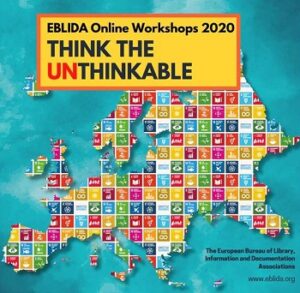EBLIDA Online Workshop 2020: “Think the Unthinkable”
The European Union has fully adopted the 2030 Agenda for Sustainable Development. It is investing an incredible amount of money in sustainable development, as never before. All EU programmes and actions are being adapting to meet SDGs.
Are libraries on the right track to sustainable development?
Sustainable development is an opportunity to raise the status of libraries in all European countries and to revitalise them with new and refreshing activities. In other words, this is the moment to think the unthinkable.
EBLIDA workshops on 13, 14 and 16 October 2020 are based on the Think The Unthinkable report, which includes topics such as library activities during the Covid-19 crisis that are likely to continue, best SDG practices in European libraries, and funding opportunities through the European Structural and Investment Funds (ESIF) 2021-2027.
Contributors to the workshop are the Members of the EBLIDA Executive Committee. They will expand upon the impact of Covid 19 on libraries, on future investments in libraries and ways of funding them.
All libraries may be potential recipients of ESI Funds. Non-EU libraries included in the Council of Europe geographic area, too, may benefit from ESI Funds through the EU Interreg programmes. This is the reason why we hope that EBLIDA Members can replicate these workshops and organise TTU webinars at national level. National workshops are being organised, for instance, in Italy, France, Spain, the Netherlands and other countries on request.
We wish to strengthen our forces towards common objectives and transition to a post-Covid library age. Each workshop will be divided into three parts.
The first part is dedicated to the post-Covid 19 library. Activities run by libraries during the Covid-19 crisis branched into two different directions: a socially inclusive library, when libraries organised the production of face masks, food distribution together with book deliveries, community calls for people left behind or marginalised. The digital library also boomed, in particular in public libraries: where books were not delivered, they were replaced by e-books.
The EBLIDA First European report on Sustainable development and European libraries will be the focus of the second contribution. The lively participation of European libraries in the implementation of SDGs is a sign that libraries can go one step further in advocacy and that, beyond stories, their 2030 Agenda can explore a more advanced narrative of policies and indicators. As Wimmer rightly points out, there is a need to go beyond grassroots involvement and enthusiasm and to start with well-defined policies – and some states have already started to do so.
And finally, during the workshop, EBLIDA will provide free of charge consultancy work to EBLIDA Members on how to access ESI Funds. ESI Funds are the way in which cutting-edge EU programmes are applied on a national basis. ESI Funds are European, but they are “given back” to Member States (and also neighbouring States through the Interreg programmes), in order to pursue cohesion objectives. Relevant ESI Funds for libraries are the ERDF (European Regional Development Fund) and the ESF+ (European Social Fund Plus).
More details: http://www.eblida.
